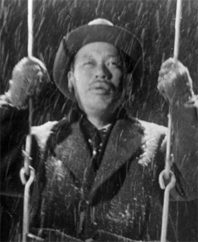
Watanabe (Takashi Shimura) cowers into bed after getting flashbacks of his life with his son Mitsuo (Nobuo Kaneko). He slips under the covers. Ikiru then shows a certificate noting the fact that he worked for the government for 25 years. There’s a lot of paper in the movie which is, after all, about the life of a bureaucrat. There’s a sadness that a sheet can summarize 25 years. A destructible material records a reductive account. That realization can stop anyone in their tracks. It can hit a young person with a precarious life. But it’s especially heavy in the mind on someone like Watanabe. He discovers that he has a disease that only gives him six months to live.
Ikiru then records every reaction a person gets when they receive the worst possible news he could ever get. This includes going on benders with a bunch of youngsters. He wants to burn away the money he tucked in to a savings account. Better that than his ungrateful son and daughter in law getting their grubby hands on it. That sounds like the premise for a comedy, and the movie has strands of that. But it still considers the hangover one gets after such benders. During the morning after, the film surrounds Watanabe with children full of life while he hunches over. He’s waiting for his death, still not knowing how he should spend his last days.
Throughout Ikiru we see Watanabe’s face as Shimura expresses it. His eyes perpetually bulge like a monstrous mask. He references traditional acting styles that both stand out and make sense within chaotic modernity. Kurosawa closes up on him and the latter can sustain those long takes of just his face. This is true even while he converses with one of the young people he lavishes on. One of those people is his ex-coworker Toyo Odagiri (Miki Odagiri). Shimura evokes yearning, complementing Odagiri’s portrayal of weary optimism. Their performances breath life conversations pre-dates the generational clash in Tokyo Story. And this is the more complex version of that clash even when they spit out what Ozu’s characters mutter.
Previous writers have hailed Ikiru as a sentimental masterpiece, which isn’t normally a hit for present viewers. There are previous mentions of this movie’s comedy strands. This is more apparent now as post-hipster thirty somethings now flock to films like this. They howl with laughter at seemingly inappropriate moments. But those reactions are welcome. There’s funny and admirable about a man fighting the system he was a part of. In the past Watanabe would have mistreated women at work. He would have made them walk from one department to another without hearing their complains. Now he’s leading them. And audiences can learn from men like him who, as the title suggest, should live like life won’t last.
- Release Date: 1/1/1952

